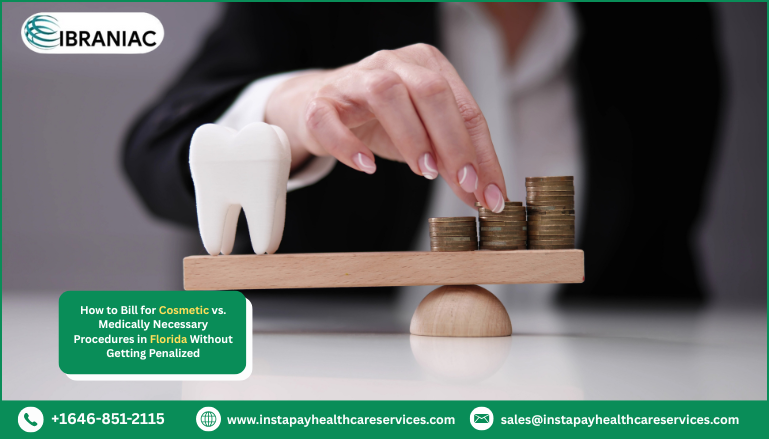
How to Bill for Cosmetic vs. Medically Necessary Procedures in Florida Without Getting Penalized
When it comes to dental billing in Florida, knowing where to draw the line between cosmetic and medically necessary procedures isn’t just a matter of compliance—it’s a matter of survival. Dental practices that misclassify treatments or use incorrect CDT codes risk denied claims, patient disputes, and even audits. Understanding Florida’s dental billing rules is essential for ensuring accurate reimbursement and protecting your practice from penalties.
Cosmetic vs. Medically Necessary: Where’s the Line?
A cosmetic dental procedure is one performed solely to enhance appearance, such as teeth whitening or veneers. These are typically not covered by insurance, as they don’t address underlying health concerns
On the other hand, a medically necessary dental procedure is done to treat disease, restore function, or prevent deterioration. This includes things like root canals, crowns for cracked teeth, or extractions of infected wisdom teeth.
However, many procedures fall into a gray area. For example:
- A veneer placed for a fractured tooth can be considered medically necessary.
- Orthodontics might be covered for jaw misalignment, but not for mild crowding.
- Crowns placed for structural damage due to decay are usually covered, but those done for aesthetics are not.
Florida providers must document intent, diagnosis, and function to prove medical necessity—especially for treatments that look cosmetic.
Common Billing Mistakes That Trigger Penalties
Florida’s dental billing ecosystem is closely monitored by both commercial insurers and Medicaid. These are the most common mistakes that can raise red flags:
- Using the wrong CDT code (e.g., cosmetic veneers billed as medically necessary crowns)
- Lack of clinical justification in the patient’s chart
- “Creative coding” to push non-covered services through as covered
- No pre-authorization when required for borderline procedures
These errors not only delay payment—they can lead to audits or even accusations of fraud.
How to Justify Medically Necessary Procedures
To avoid getting penalized, your billing team must be meticulous with documentation and coding. Here’s how to get it right:
1. Use Precise CDT Codes
Every CDT code has a specific definition. For example:
- D2950: Core buildup, including any pins, indicates a medical need to support a crown.
- D5213: Mandibular partial denture, cast metal framework with resin denture bases—used only when function is impaired, not for aesthetic enhancement.
- D4346: Scaling in presence of generalized moderate or severe gingival inflammation—not a substitute for routine cleaning codes.
Always match the code to the actual condition and procedure—not just what the patient wants.
2. Document the Medical Need
Include:
- Diagnosis (e.g., enamel erosion, traumatic injury)
- X-rays and photos
- Narrative justification (“To restore occlusion and prevent further deterioration”)
This helps insurers see the functional necessity, not just the appearance.
3. Know Florida’s Payer Requirements
Florida Medicaid and insurers like Delta Dental and Humana have specific billing requirements. For example:
- Some require pre-treatment estimates for crowns or implants.
- Others deny claims unless tooth-specific documentation is attached.
Stay up to date on Florida’s dental billing rules and adjust workflows accordingly.
Final Thoughts
Navigating dental billing in Florida means understanding the subtle but critical difference between what patients want and what insurers are willing to pay for. By using correct CDT codes, providing airtight documentation, and staying compliant with Florida’s dental billing rules, your practice can avoid costly penalties—and get paid faster.
Handling a dental clinic and dealing with billing intricacies simultaneously is not an easy task. This is when outsourcing becomes a savior! With its dental billing expertise and Florida’s billing experience, Instapay Healthcare Services offers best of both the world, all at once.
When in doubt, source it out from Instapay Healthcare Services- your dental billing service provider right here in Florida!




